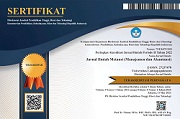Analisis Faktor-Faktor Resistensi Individual Pada Perubahan Kepemimpinan di PT Alamjaya Wirasentosa Kota Gunungsitoli
Abstract
This research analyzes Individual Resistance Factors in leadership Change at PT. Alamjaya Wirasentosa Gunungsitoli City, Individual resistance to change is the resistance that arises in individuals towards changes in an organization, while we know that changes must be made to advance the performance of an organization. Based on observations, there is still an attitude of resistance shown by each employee towards the changes made. The aim of the research is to find out how individual resistance occurs among employees due to leadership changes at PT. Alamjaya Wirasentosa, Gunungsitoli City. In conducting this research, qualitative research methods were used using data collection techniques, namely observation, interviews and documentation. The data analysis technique is data reduction, data presentation and conclusion drawing. The sources of informants for this research were 3 people. The research results show that changes at PT. Alamjaya Wirasentosa Gunungsitoli City occurred when there was a change of leadership, employees felt that with a change of leadership there would certainly be changes that would follow in terms of work methods and rules or existing habits. Individual resistance occurs when fear factors and selective perception exist in the individual himself. Based on the interview results, these two factors are the biggest drivers of individual resistance in employees.
References
Abdurachman, D., Ramdhan, R. M., Karsoma, A., Winarno, A., & Hermana, D. (2023). Integrating Leadership in Job Demand Resources (JD-R) for Personal Performance in Military Institution. Sustainability (Switzerland), 15(5), 1–13. https://doi.org/10.3390/su15054004
Aboramadan, M., Crawford, J., Türkmenoğlu, M. A., & Farao, C. (2022). Green inclusive leadership and employee green behaviors in the hotel industry: Does perceived green organizational support matter? International Journal of Hospitality Management, 107(September), 103330. https://doi.org/10.1016/j.ijhm.2022.103330
AlSuwaidi, M., Eid, R., & Agag, G. (2021). Understanding the link between CSR and employee green behaviour. Journal of Hospitality and Tourism Management, 46(October 2020), 50–61. https://doi.org/10.1016/j.jhtm.2020.11.008
Aman-Ullah, A., Mehmood, W., Amin, S., & Abbas, Y. A. (2022). Human capital and organizational performance: A moderation study through innovative leadership. Journal of Innovation and Knowledge, 7(4), 100261. https://doi.org/10.1016/j.jik.2022.100261
Davis, M. C., Unsworth, K. L., Russell, S. V., & Galvan, J. J. (2020). Can green behaviors really be increased for all employees? Trade-offs for “deep greens” in a goal-oriented green human resource management intervention. In Business Strategy and the Environment (Vol. 29, Issue 2). https://doi.org/10.1002/bse.2367
Farooq, K., Yusliza, M. Y., Muhammad, Z., & Mat, N. H. N. (2022). Make it their Decisions, not your Directives: Exploring Required Green Competencies for Employee Ecological Behaviour. Organizacija, 55(2), 128–141. https://doi.org/10.2478/orga-2022-0009
Halawa, F., Iswanto, D., Reinelda, B., & Yunarni, T. (2023). JOURNAL OF MANAGEMENT Small and Medium Enterprises (SME’s) Vol 16, No. 3, November 2023, p495-501 Febriyanti Amol, Forman Halawa, Dedy Iswanto, Baiq Reinelda Tri Yunarni. 16(3), 7–10.
Katz, I. M., Rauvola, R. S., Rudolph, C. W., & Zacher, H. (2022). Employee green behavior: A meta-analysis. Corporate Social Responsibility and Environmental Management, 29(5), 1146–1157. https://doi.org/10.1002/csr.2260
Liu, L., & Zhang, C. (2022). Linking environmental management accounting to green organisational behaviour: The mediating role of green human resource management. PLoS ONE, 17(12 December), 1–17. https://doi.org/10.1371/journal.pone.0279568
Malsha, K. P. P. H. G. N., Anton Arulrajah, A., & Senthilnathan, S. (2020). Mediating role of employee green behaviour towards sustainability performance of banks. Journal of Governance and Regulation, 9(2), 92–102. https://doi.org/10.22495/jgrv9i2art7
Nuzulia, A. (1967). Tinjauan Literatur Tentang Pengembangan Pembelajaran Dalam Mengimplementasikan Kurikulum 2013 Alfin. Angewandte Chemie International Edition, 6(11), 951–952., 01(01), 5–24.
Purwanto, A., Tukiran, M., Asbari, M., Hyun, C. C., Santoso, P. B., & Wijayanti, L. M. (2020). Model kepemimpinan di lembaga pendidikan: a schematic literature review. Journal of Engineering and Management Science Research (JIEMAR), 1(2), 255–266. https://journals.indexcopernicus.com/search/article?articleId=2660964
Raden Soebiartika, & Ida Rindaningsih. (2023). Systematic Literature Review (SLR): Implementasi Sistim Kompensasi dan Penghargaan Terhadap Kinerja Guru SD Muhammadiyah Sidoarjo. MAMEN: Jurnal Manajemen, 2(1), 171–185. https://doi.org/10.55123/mamen.v2i1.1630
Rashid, W., Ghani, U., Khan, K., & Usman, M. (2023). If you care I care: role of Green Human Resource Management in employees green behaviors. Cogent Business & Management, 10(1). https://doi.org/10.1080/23311975.2023.2189768
Ren, S., Tang, G., & Zhang, S. (2023). Small Actions Can Make a Big Difference: Voluntary Employee Green Behaviour at Work and Affective Commitment to the Organization. British Journal of Management, 34(1), 72–90. https://doi.org/10.1111/1467-8551.12597
Salahaddin, S. D., Haido, J. H., & Wardeh, G. (2022). The behavior of UHPC containing recycled glass waste in place of cementitious materials: A comprehensive review. Case Studies in Construction Materials, 17(August), e01494. https://doi.org/10.1016/j.cscm.2022.e01494
Uddin, M. A., Akter, R., Al-Amin, M., Rahman, M. S., & Ferdausy, S. (2020). How Do Socially Responsible Human Resource Management and Voluntary Green Behavior Influence Organizational Competitiveness? In Studies in Business and Economics (Vol. 15, Issue 2, pp. 243–255). https://doi.org/10.2478/sbe-2020-0038
Wood, B. P., Eid, R., & Agag, G. (2021). A multilevel investigation of the link between ethical leadership behaviour and employees green behaviour in the hospitality industry. International Journal of Hospitality Management, 97(October 2020), 102993. https://doi.org/10.1016/j.ijhm.2021.102993
Yuan, B., & Li, J. (2023). Understanding the Impact of Environmentally Specific Servant Leadership on Employees’ Pro-Environmental Behaviors in the Workplace: Based on the Proactive Motivation Model. International Journal of Environmental Research and Public Health, 20(1). https://doi.org/10.3390/ijerph20010567
Yue, G., Wei, H., Khan, N. U., Saufi, R. A., Yaziz, M. F. A., & Bazkiaei, H. A. (2023). Does the Environmental Management System Predict TBL Performance of Manufacturers? The Role of Green HRM Practices and OCBE as Serial Mediators. Sustainability (Switzerland), 15(3). https://doi.org/10.3390/su15032436














